Looking at a team of football (soccer), the players seem to suffer from various handicaps. In interviews, they hardly manage to utter some logical phrases, in a Winnetou-style oppressed manner in their mother-tongue and if you ask them more than two questions they seem to be really blown away.
Now, a new research explains this: soccer players experience some degree of brain-tissue shrinkage, a growing evidence that this sport poses a risk of long-term brain injury. High-resolution MRI brain scans revealed less gray matter in the brains of 10 male college soccer players, when compared with 10 young men who had never played the sport.
Grey matter represents the brain cells (their body mass) where all cognitive functions occur (from thinking to memory). The significance of the smaller gray matter volume and density observed in these players was not yet clear for the researchers (for us, living soccer breathing Europe, it is). Still, some past researches have discovered that professional and even college-age soccer players are prone to memory and attention issues than non-players.
"Among players in the current study, reduced gray matter was seen in a part of the brain called the anterior temporal cortex - which is consistent with effects from repeated knocks to the front of the head," wrote the researchers from the University of Cincinnati College of Medicine in Ohio. Like in many other contact sports, soccer presents the risk of collision between players and repeated ones can induce brain damage. It is a vivid debate if the ordinary "heading" of the soccer ball increases the risk of brain injury. Of the examined 10 soccer players, only 2 told they'd experienced a mild concussion in the past, but none related a severe head impact.
"I'd be very reluctant to ascribe this purely to heading," said co-author Dr Caleb Adler, an assistant professor of psychiatry and neuroscience at the University of Cincinnati College of Medicine.
"The bottom line is that while these findings are preliminary, they add to evidence that soccer is not an entirely benign sport. Any activity is a balance of risk and benefits," Adler told Reuters Health.
"Some youth soccer leagues ban heading before a certain age. But further safety measures, including head gear that would lessen the impact of any knock to the head, might be warranted. More research is needed to flesh out the potential long-term brain injury risks associated with soccer." he added.

 14 DAY TRIAL //
14 DAY TRIAL //